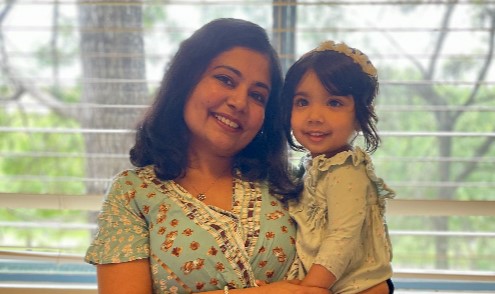When Mridula Menon and her husband moved to Australia in 2017, they dreamed of a brighter future.
Instead, she’s now having to ask the community for support to help fund a targeted cancerA disease where abnormal cells split without control and spread to other nearby body tissue and/or organs. Cancer cells can also spread to other parts of the body through the bloodstream and lymph systems. treatment that could save her life.
In 2020, at 37 weeks pregnant and with the world on the brink of the COVID-19 pandemic, a tumour was found in Mridula’s ovary.
“The weight of the word ‘cancer’ bore down our world bringing fear and uncertainty,” Mridula said.
“I always had robust health and infrequent visits to doctors, and here I was thrust into a reality I never imagined.”
Mridula immediately underwent an emergency C-section, including the removal of her right ovary and the tumour. A biopsyTo take a small piece of body tissue and test it in a laboratory. revealed she had stage 4 gastric cancer.
As international borders closed during COVID, and with their newborn daughter in the neonatal unit, Mridula had to start fortnightly chemotherapy
• a chemical drug treatment to kill or slow-growing cancer Cells
• these drugs are called cytotoxic drugs
with limited support.
“We found strength in the unwavering support of our close friends,” Mridula said.
“With their help and the arrival of my mother, who was granted an exemption to travel, and my husband taking a year-and-a-half sabbatical, whilst I battled postnatal depression, we slowly began to rebuild our lives.”
Gastric cancer is rare, aggressive and has limited research and treatment.
“The doctors delivered a grim prognosisTo predict how a disease/condition may progress and what the outcome might be., informing us that if the chemotherapy worked, I might have a maximum of six months,” Mridula said.
Three years on, Mridula has endured multiple treatments and surgeries, recently having brain surgery to remove a 6cm lesion, followed by radiation targeting new spots found during brain MRIs.
Although the rest of her body has no evidence of active disease, her oncologistA doctor who is a specialist in cancer treatment. is concerned about the recurring brain metastases, which cannot be treated with chemotherapy.
Hope exists in the form of a targeted drug called Enhertu, but it’s not subsidised on the Pharmaceutical Benefits Scheme for Mridula’s cancer. Three applications for compassionate access have been rejected.
Instead, Mridula’s young family is forced to pay $12,000 every three weeks to access Enhertu – an impossible amount on a single income.
Mridula is asking for the community to support her in raising $200,000 so she can continue accessing the drug until other options, like clinical trials, are available.
“Every contribution, whether it’s $10, $100 or any amount within your means will serve as a beacon of hope, guiding us through the darkness of this battle,” she said.
“This way, you will give me the chance to witness my daughter’s milestones, to hold her close, and to shape her beautiful future that lies ahead.”
Donations to help Mridula can be made online.
ENDS
Media contact
Laura Cohalan, Communications Specialist
Rare Cancers Australia
0437 927 292
